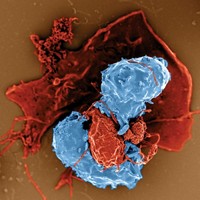Advertisement
Grab your lab coat. Let's get started
Welcome!
Welcome!
Create an account below to get 6 C&EN articles per month, receive newsletters and more - all free.
It seems this is your first time logging in online. Please enter the following information to continue.
As an ACS member you automatically get access to this site. All we need is few more details to create your reading experience.
Not you? Sign in with a different account.
Not you? Sign in with a different account.
ERROR 1
ERROR 1
ERROR 2
ERROR 2
ERROR 2
ERROR 2
ERROR 2
Password and Confirm password must match.
If you have an ACS member number, please enter it here so we can link this account to your membership. (optional)
ERROR 2
ACS values your privacy. By submitting your information, you are gaining access to C&EN and subscribing to our weekly newsletter. We use the information you provide to make your reading experience better, and we will never sell your data to third party members.
Biologics
Interest grows in cell therapy for autoimmunity
A flurry of financial activity from cell therapy companies focused on regulatory T cells
by Megha Satyanarayana
August 19, 2021
| A version of this story appeared in
Volume 99, Issue 30

It’s been a busy—and lucrative—summer for companies trying to engineer T cells to fight autoimmune diseases.
In late June, Abata Therapeutics launched with $95 million in series A funding to tackle multiple sclerosis. In early August, Sonoma Biotherapeutics reported raising $265 million in series B funding to continue working on treatments for rheumatoid arthritis. A few days later, GentiBio announced it had $157 million in series A funding to address autoimmune and related diseases.
While several cell therapy companies are focused on ramping up T cell activity to fight cancer, Abata, Sonoma, GentiBio, and others are trying to do the opposite: turn down an overactive immune response to quell autoimmunity. To do this, they are engineering a small population of T cells called regulatory T cells, or Tregs.
Fred Ramsdell, chief scientific officer of Sonoma, says the flurry of activity surrounding Tregs as a cell therapy is long overdue. Scientists have known for more than 20 years that Tregs could control autoimmune disease, but the technology to develop the cells as a therapy wasn’t ripe enough. Successes in engineering T cells to boost the immune system to fight tumors has in turn helped advance the field of engineered Tregs.
“There’s this recognition that, if we treat tumors with cells, why can’t we treat autoimmune disease with cells? And these are the right cells to do it,” Ramsdell says, referring to Tregs. “If we can do that, I think we’re going to make a really big change in patients’ lives.”
Abata CEO Samantha Singer recently told C&EN that the company is trying to engineer Tregs with a T cell receptor that is specific to a section of the myelin basic protein, which is what gets destroyed in people with multiple sclerosis. Those cells can then home in on damaged areas and, in theory, convince an overactive immune system to settle down.
Ramsdell says Sonoma is working on an undisclosed target in a subset of people with rheumatoid arthritis, with the same idea: build a rheumatoid arthritis–specific chimeric antigen receptor (CAR) or T cell receptor that will get Tregs to the right sites of inflammation and tell their overactive immune brethren to knock it off. He expects the company to be in clinical trials by the middle of 2022.
For now, the development of Tregs as a treatment generally relies on removing an individual’s T cells, isolating the Tregs, coaxing them to divide into the billions, and then returning them to the person they came from. Preclinical tests at Sonoma suggest these cells are safe and that they last. GentiBio is trying something a little different: taking more-abundant effector T cells and converting them biochemically to Tregs.
Some open questions in the field include frequency of dosage, as well as the possibility that bombarding the body with billions of Tregs might nonspecifically turn down other, potentially normal, immune responses. Plus, Tregs need to be fed a steady diet of interleukin-2, a small protein that comes with side effects of its own.
Ramsdell says Tregs hold a lot of potential and that the roughly half-dozen companies involved are working on a “real game changer.”
“It’s really heartening to me to see a lot of people trying to figure this out,” he says.




Join the conversation
Contact the reporter
Submit a Letter to the Editor for publication
Engage with us on Twitter